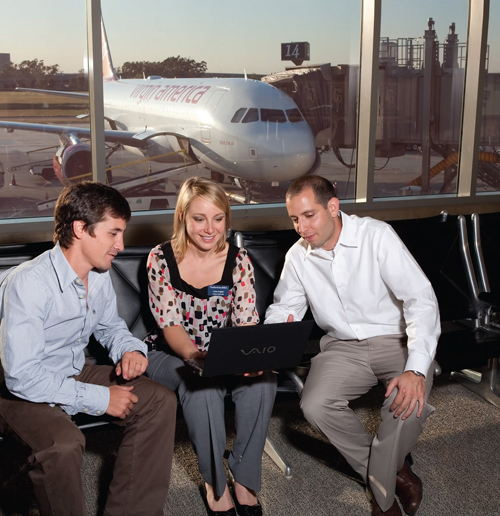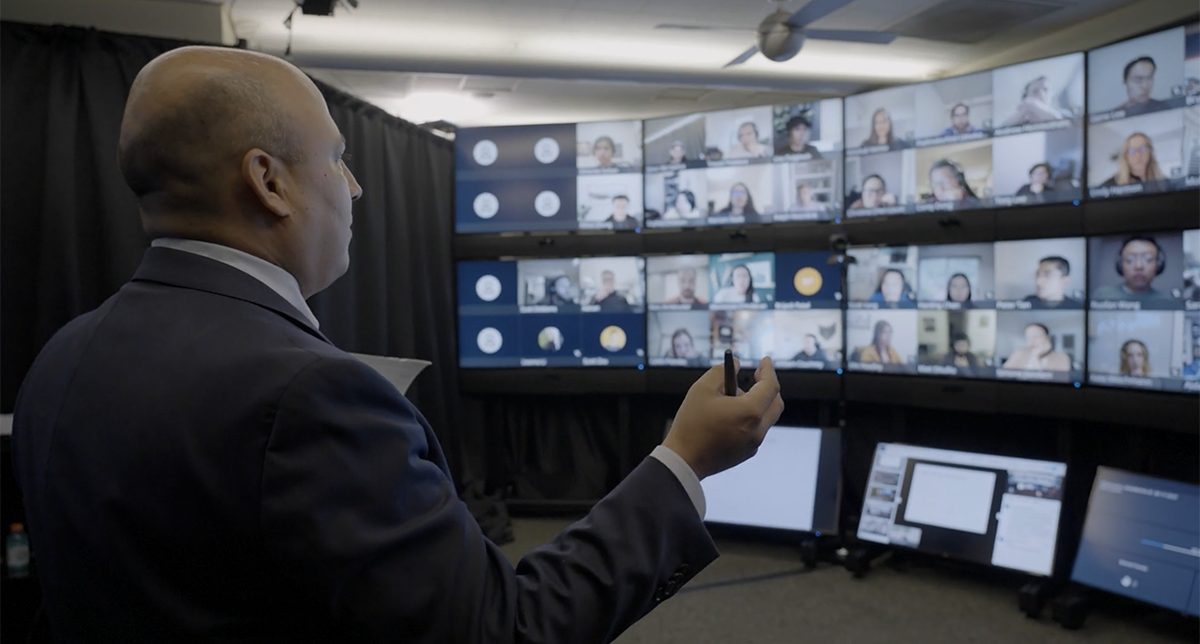The first time I gave “MBA group work” in business school any thought was when I thumbed through the admissions brochure from Berkeley Haas. I remember, quite vividly, a photo that showed three dedicated Evening and Weekend MBA students peering awkwardly (it was clearly a posed photo) into a laptop, while sitting at a gate at SFO – with a shiny Virgin America A320 parked behind them. Suddenly, group work meant doing sexy consulting projects that would earn me first-class upgrades and probably a great job at an amazing brand. Sign me up!

What I didn’t know then, however, was that the reality of working in groups has been much, much better – even though I’ve yet to get a single travel perk doing it.
Throughout both my undergrad program and while earning an M.A., 99% of the way I was evaluated – grades – was about individual results. I remember exactly one significant group project in six years. One!
Yet, outside of school, most of my career has involved team effort. From planning presidential campaign events, to managing proposals, to building a business from scratch, nearly everything significant that I’ve accomplished has been as part of a team. It took going to business school for school to look even a little bit like… business.
At Berkeley Haas, collaboration – rather than just ‘group work’ – is the norm, not the exception. While each professor structures things a little differently, nearly every class requires at least one group project. In some – and our core strategy class last spring comes to mind – most of the class is based on the work done in groups. And nowhere at Haas do our defining principles shine brighter than when a bunch of MBA students form a team.
If you’re a fan of the late-90s Aaron Sorkin show Sports Night, you might remember a great quote from the short-lived show. It came from Robert Guillaume’s character, Isaac Jaffe: “If you’re dumb, surround yourself with smart people. If you’re smart, surround yourself with smart people who disagree with you.”
Groups are the perfect place to practice that. (Who in their right mind would hope to be the smartest person in their study group?) And project teams at school are the perfect place to try out a different role for yourself, too. It’s not easy, for example, to be the contrarian in a group at work, no matter how effectively you can support your arguments. But it’s good practice to take on that role now and then. At Haas, we encourage each other to question the status quo.
My classmates at Haas are smart, accomplished, and ambitious. You’d expect that in any sample of MBA students, I’m sure. And they’re also generous to a fault, wickedly funny, and – here’s what I doubt you’ll find in just any sample of MBA students – incredibly humble. The folks in Admissions do a pretty amazing job screening for that, and it makes more of a difference than you could possibly appreciate until you spend a few months with this crowd.
As groups dive deep into their projects, the work can get intense and, sometimes, tiring. It can be hard not to fall in love with your own approach, or with the answer you worked hard to get. Despite that, you won’t see a lot of braggadocio here. We’re a collaborative, but still largely data-driven, group. The best ideas, presented effectively, rather than the loudest arguments, usually win. Success comes with confidence – and without attitude.
Recently, I took an informal poll (as opposed to the many formal surveys your friends will ask you to take to support their group projects) of some of our Evening & Weekend MBA students, and I asked them what they look for when thinking about what electives to take. (In the EWMBA program now, there are three semesters of core classes, followed by three semesters of electives). Beyond certain “don’t miss” classes with perennial favorite professors, the most common criterion was “lots of group stuff.”
Teamwork can be energizing, fun, and social. Working with others allows you to learn from classmates who bring their career experience into the group. They allow you to learn about classmates with different experience, too. Good teamwork levels the hills and valleys of knowledge you experience during a semester, as different classmates take the lead at different times. Solving problems as a team forces each member to look at issues from perspectives other than their own. We learn a lot in those groups. In group work, we’re students always.
Perhaps the best part of the MBA group work experience is the support you will get from, and give to, one another. One insightful classmate, as he tried diligently (and just barely successfully) to explain basic calculus to me, summed it up. “This program,” he opined, “is designed so that you cannot possibly do it alone.”
And so it is. No one is strong in every subject, nor does anyone have experience in everything you’ll study while working toward your MBA. If they did, they certainly wouldn’t be sitting in class next to you. Those folks (sightings of whom are rarer than those of the Loch Ness Monster) have better things to do with their Saturdays.
I’ve often relied on the kindness of classmates to fully understand a new concept, and I have been happy to return the favor in areas I understand. As you get to know your colleagues, you will see that they are always willing to give. You too will find ways to go beyond yourself to help them.
So, my advice as you embark on your MBA experience – be it at Haas or elsewhere – is to prepare for the challenging – and fun – nature of collaborative work. You’ll learn a lot about yourself and your colleagues in the process.







